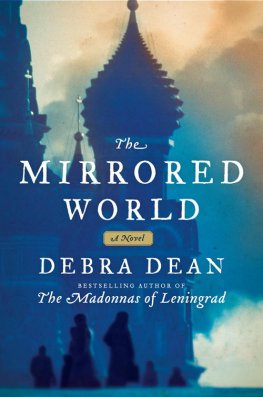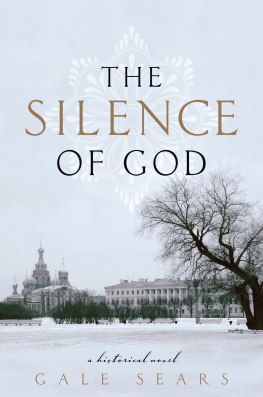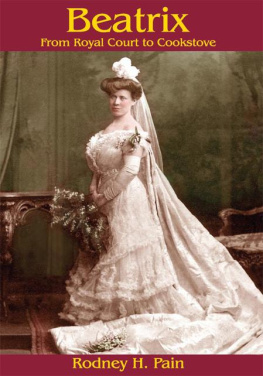Debra Dean
THE MIRRORED WORLD
A Novel
For my mother, Beverly A. Taylor
For if we genuinely love Him
we awaken as the Beloved
in every last part of our body.
SAINT SYMEON THE THEOLOGIAN
This is a work of fiction. While I have tried not to contravene what is known, I have invented between the lines of history. This story should not be read as a factual rendering of the historical personages or events that appear herein.
Yes, this was her house many years ago, when she was still Xenia. The things you see herethe few furnishings, the books and mementosthey are mine. I have sold and given away much; only a little remains. A feather. This stone with a white ring round it. A birds skull. Look how delicate it is, thinner than porcelain. This scrap of gold lace from the sleeve of a court dress. I have reached an age when I can see how little all my possessions were worth and even to feel them as a burden on my soul. But the effort to rid myself of it all as Xenia once said, the things of the world cling like vines.
As it happens, this is doubly true of those possessions which are immaterialthe griefs and fears, my reason which I have prized beyond measure, the memories that feel like the sum of me. I am not a holy fool who can give these up.
The earliest memoryblackness, and in this blackness the sound of church bells clanging wildlyit is of her coming. Clambering down from the bed I share with my nyanya, a treacherous descent in the dark, I go to the window. The dusky summer sky is shimmering. Orange, violet, redthe northern lights pulse and flareand in the street, a man falls to his knees and crosses himself. People are shouting, their words a blur but infused with unmistakable urgency. A riderless white horse careens into view. It rears up and then races on, its tail and mane flying like ragged sails behind it. Frightened, I return to the bed and press my body against Olgas. The next image is that of our bedroom door bursting open and through it, an enormous wolf entering. The wolf says, quite calmly, that its house is afire.
For years, I believed this to be an uncommonly vivid dream. It was only much later, upon hearing my nurse talking about events long pastas old ones are wont to do, as I am doing even nowthat I recognized in her story certain unmistakable features of my dream.
There was a terrible fire late in the summer of 1736, the sixth year of Her Imperial Majesty Anna Ioannovnas reign and the fourth year of my life. The fire was said to have begun in a stable near what is now Sadovaya Street, but it spread like a storm through the city. People fled their homes with only those few things they could carry, icons and tableware, a handful of jewelry, whatever they had snatched up in their alarm. One man was seen dragging his bed through the street. An old woman was found in her nightclothes, clutching a squawking goose to her breast. There was no fire brigade then, nor means to draw water from the canals, and in the end over two thousand houses were lost. What I mistook for the northern lights was the entire Admiralty district being consumed by flames.
What I took for a wolf was Xenia. Her mother had escaped their home carrying a daughter in her arms, five rubles in a velvet purse, and a sausage that had been hanging on the larder door. She crossed the pontoon bridge over the Neva, her elder daughter and a servant trailing behind, and walked until she came upon a house she knew, belonging to her husbands cousin. They arrived at our doorstep in the middle of the night. The houseman carried Xenia to my bed, still bundled in a fur lap robe and slung on his shoulder.
You shrieked at the sight of her, Olga told me later. I could not calm you.
After the fire, Olgas place in the bed was taken by Xenia and her sister, Nadya. Their father and mine were off fighting the Turks, and so while the city was rebuilding they lived with us. By Olgas account, I slept fitfully for weeks afterwards, plagued by night terrors. What I recall is the sound of howling. Petersburg was much smaller then, muddy and raw and shadowed by forest, and at night one might still hear wolves. I could not help myself, I clutched at Xenia because my nurse was not there. I whimpered to her my fear that the wolves were coming to eat us.
They are not hungry, she whispered. They are singing.
I was not so easily mollified. It did not sound like singing.
That is because you are not a wolf. Listen. She is singing of how lonesome she is. The long wail did indeed sound bereft. After a while, a second voice joined the first. There, her mate is answering. It must be a very beautiful sound to her.
She twined her arms round me. I am here, Dashenka. You are not alone. On the word alone, she made her voice rise into a howl. I giggled.
Now you answer, she said.
What?
You must sing, too.
I answered her howls with my own until Nadya snapped at us to be still and let her sleep.
It was intended that they stay only until their father returned, but he perished the following year at the storming of Ochakiv. Their future was resettled in that moment. They remained, and I forgot that there had ever been a time before them.
Whatever we know as children, this is the world, eaten whole and without question. So it was with Xenia: I did not think her strange, though an accounting of her features alone would set her apart. She was tall and thin as a willow slip, her nose and chin were rather too sharp, and her pale hair so fine that it continually escaped ribbons and combs. When she moved, wisps lifted and floated about her head, giving her the unkempt and airy appearance of a dandelion blown to seed. Following the science of physiognomy, one might discover her character by this and also by her eyes, which were uncommonly bright but of no definite hue, being very green in one light but the color of hazelnuts in another.
I am reminded of a curiosity we saw as children, housed in the Kunstkamera. This device resembled a sailors eyeglass. However, peering into the eyepiece, one did not view the ordinary world beyond the glass. Improbably, the horizon filled with brightly colored shards of light, a brilliant mosaic that could be made to break apart and re-form into endless new patterns simply by turning a small knob. It did not seem possible that a narrow brass tube could contain so huge and magnificent a wonder, and yet it did.
Some few days after we visited the museum, I remember, Xenia picked up a feather from the ground and was as giddy as if she had found a ruby in the dirt.
She held it up to the light. Look.
It is a ravens feather, I thought. My countenance must have shown my ignorance.
It is black, but look what happens. She rolled the quill slowly between her fingers. Do you see it, the blue? And now emerald Colors shimmered on its oily surface. And there is purple! And even red. It is like the Kaleidoscope!
I saw then that it was an astonishing feather.
When I parroted her admiration, she handed it to me without a blink. It is yours, she said. In this same manner, she later gifted me with the birds skull and the skipping stone and various insects and wildflowersmy own museum of wonders and curiosities.
What consumed her one moment was forgotten in the next, but while in the grip of a passion, she could not be swayed from it, no matter how reckless. She ate wild mushrooms without first bringing them home for Olga to inspect. She approached mangy cats and dogs in the street and would coax into friendly submission even those who warned her off with low growls or arched backs. None ever bit her, but the reward for her undiscriminating friendliness was that she smelled of garlic from Olga continually treating her for ringworm.











